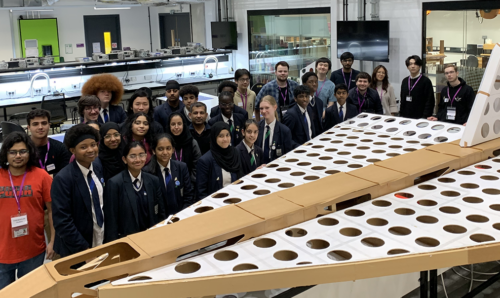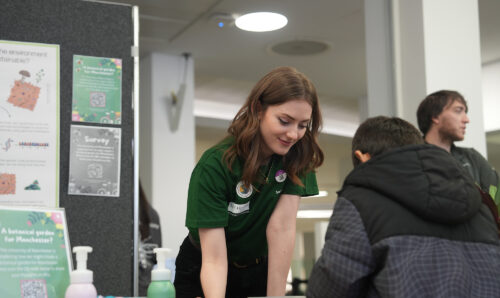Innovation from a crisis: Meet FSE’s COVID Catalysts
Research impact and institutes 5 November 2020
A year ago we could never have imagined what 2020 had in store. COVID-19 has impacted our lives immeasurably – and could do for some time more.
But out of a crisis often comes innovation, new ways of doing things and a determination to make things better.
This has certainly been evident here in the Faculty of Science and Engineering (FSE), and a number of our leading experts have lent their voices to the University’s research beacons COVID Catalysts campaign, a collection of flash lectures demonstrating how the virus can act as a catalyst for positive change.
Let’s meet them…
Energy
Professor Alice Larkin

Professor Alice Larkin is Head of the School of Engineering and Professor of Climate Science and Energy Policy. In her lecture she considers how we might use our lessons from lockdown to transform our energy systems and, ultimately, help tackle climate change.
She asks: “Can decision-makers direct investment that we now know can be made available towards regional and nationwide rapid and radical interventions? Retrofitting our entire housing stock, repurposing our roads for cycling and walking, accelerating the roll-out of renewable energy.
“If we don’t take advantage of this moment in time where we have demonstrated that society can accept deep change, then we will pass up our opportunity of a lifetime to help future generations.”
Watch Professor Larkin’s COVID Catalyst lecture.
Professor Richard Taylor

BNFL chair in Nuclear Energy Systems at the University’s Dalton Nuclear Institute, Professor Richard Taylor uses his lecture to place focus on one of this century’s greatest challenges: the drive to net zero.
He suggests that small nuclear reactors could be integral to the UK meeting its decarbonisation targets as it emerges from the COVID-19 crisis: “The takeaway message is net zero is a massive challenge for us all, a massive opportunity for us all to build back better after the pandemic.
“But what it needs is courage and resolution. It needs big ideas and in its own perhaps modest way, small modular reactors and small nuclear may play a part in that bigger plan.”
Listen to Professor Taylor’s COVID Catalyst lecture.
Dr Claire Hoolohan

In her lecture Dr Claire Hoolohan, Research Fellow at the Tyndall Centre for Climate Change Research, ponders the implications that COVID-19, and resultant shifting social practices, might have on sustainable living.
Could this unprecedented disruption to everyday life in fact lead to people leading healthier, happier and more sustainable lives?
“Some people are taking much longer days with big breaks in the middle, others working much earlier and some later into the evening,” she observes. “This seemingly trivial re-sequencing of everyday routines – if it was to continue could deliver the types of time shifts sought after in demand management and lead to wider changes in the energy system that are needed to address climate change.”
Watch the full version of Dr Hoolohan’s COVID Catalyst lecture.
Advanced Materials
James Baker

As CEO of Graphene@Manchester James Baker knows a thing or two about 2D materials. In this lecture he looks at how materials such as graphene can not only lead to a more sustainable world, but prove how quickly research can be turned into products and applications.
The COVID-19 pandemic has demanded a faster journey from idea to reality – a model of innovation already championed at Manchester.
“If it fails, fail fast and learn, move on and rapidly innovate to go forward,” he explains. “Overall, I’m seeing some real challenges post-COVID. But actually I can see some real opportunities.”
James Baker’s lecture can be viewed on the COVID Catalyst website.
Professor Michael Shaver

Michael Shaver is a Professor of Polymer Science in the Department of Materials. In his lecture he shines the light on single-use plastics and how their increased use during the pandemic – for face masks, gloves, and more – might lead to greater innovation and, ultimately, a circular plastics economy.
He says: “Our expertise and the expertise in the Sustainable Materials Innovation Hub really allows us to do world-class research on how we can both improve the sustainability of how we use materials in promoting reuse, as well as what happens to those materials at end of life, to promote a more circular plastics economy and try and recover value from those materials.”
Listen to Professor Shaver’s full COVID Catalyst lecture.
Industrial Biotechnology
Dr Andrew Welfle

For his lecture Dr Andrew Welfle, Research Fellow at the Tyndall Centre for Climate Change, considers how bioenergy could lead a green recovery as the UK faces up to the economic fallout of the pandemic.
“How are we going to bounce back from this COVID-19 crisis and with things like energy, how are we going to have a green recovery and use renewable energy technologies as the platform to produce our energy in the future?”
He suggests that with investment and innovation in infrastructure, bioenergy can answer some of these big questions. “COVID-19 has provided this opportunity to re-think, has provided an opportunity to think about alternative methods.”
Watch Dr Welfle’s full lecture for the COVID Catalyst campaign.
Professor Robert Field

Professor Robert Field, Director of the Manchester Institute of Biotechnology and a Professor of Chemistry, discusses the biotechnology revolution – and how it could deliver a greener, cleaner future.
In the lecture he explains how the pandemic – and a need to meet the challenges of such a significant health crisis – could scale up this revolution: “The future is bright. The future is green and clean.
“We need to make sure that we’re at the forefront of this biotechnology innovation and implementation revolution as we go forward – and Manchester is very well placed to take that step to replace some of the more conventional industries that Manchester has been well known for over the centuries.”
View Professor Field’s full COVID Catalyst lecture.
If you enjoyed this post, be sure to subscribe on our homepage to keep up to date with the latest posts from The Hub.
Words: Joe Shervin
Images: The University of Manchester
Aerospace EngineeringCivil EngineeringClimate changeEngineeringGrapheneManchester Institute of BiotechnologyMaterials Science and TextilesMechanical EngineeringScience




